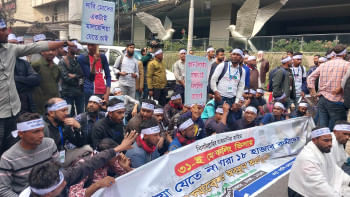Suspended in name, ‘blacklisted’ for life
Arif Hossain* has been worried about his future since his name and photo was put on a list of “suspended” workers outside his garment factory in Ashulia in the middle of January.
He knows that even though it says suspended, he has actually been fired since he would not be paid his dues unless he resigned.
What's worse is that on the list he had been labelled a thief and a vandal, and now he would not get a job in any garment factory in the Ashulia industrial area.
The list of 23 workers with allegations of vandalism and theft was hung at the gate of Al-Ghousia Textiles Ltd.
While workers claim those were false accusations, the apparel unit filed two cases to allegedly purge these labourers. These workers are considered to be vocal on trade union activities and rights issues.
In addition, the company had them blacklisted so that they do not get jobs at other factories in Ashulia, the workers alleged.
The suspensions began when garment workers took to the streets to demand a new wage board with a minimum monthly pay of Tk 16,000.
Recollecting previous instances, Laboni Akter, an organiser at the Bangladesh Garment and Industrial Workers' Federation, said finding a job in Ashulia was difficult if a worker got blacklisted this way.
Advocate AKM Nasim, who works on labour rights, said the labour law did not allow such blacklisting of workers. “It is unethical too,” he added.
According to section 24 of the Bangladesh Labour Act 2006, there is a process to follow before punishing any worker. A show-cause notice has to be issued and the workers should get seven days to respond to it. A probe committee with equal representation from workers and employers should be formed.
If the allegation is proven to be true, only then can the employer take disciplinary action.
In the case of AL-Ghousia, however, the workers did not receive any such letter, not even one informing them of the suspension order.
The employer just put up the list of workers saying they were temporarily suspended. Furthermore, the law also requires the employer to give suspension allowance, but this too might have been overlooked.
Workers say they have not received a severance allowance or their due salaries.
On a visit to AL-Ghousia Textiles on February 12, this correspondent saw the list pasted on the wall below the factory's nameplate.
Md Azmal Hossain, the factory's human resource manager, said the list was placed there to keep the workers from entering. When asked if such a practice was legal and whether the allegations against the workers were proven, he refused to comment.
The list was later taken down.
The moves though are nothing new. Since December 2016, when garment workers first took to the streets to demand a new wage board with a minimum monthly pay of Tk 16,000, the pattern has repeated itself.
Facing severe criticism by rights groups at home and abroad, Bangladesh Garment Manufacturers and Exporters Association held a press conference in February 2017 to caution factory owners against hanging such lists with names and photos and termed the practice illegal.
This time about 400 workers lost their jobs in December and January in Ashulia's eight garment units in which employees were active in forming unions, said Babul Akter, president of Bangladesh Garment and Industrial Workers' Federation.
In most cases, a list of workers who were suspended or terminated was hung outside the units, said Laboni.
IndustryALL Bangladesh Council, a national coordinating body of IndustryALL Global Union, which works to ensure better working environment and trade union rights, says more than 11,600 garment workers lost their jobs from over 100 factories following the recent wave of protests.
Commerce Minister Tipu Munshi did not respond despite repeated calls and text messages over the last two weeks.
WORKERS' LEGAL WOES CONTINUE
Following announcement of the new wage board with Tk 8,000 as minimum pay, which is half of the amount initially pressed for, workers discovered that they were relegated to lower grades just to match their earlier wages.
As they stopped working on January 11 in protest, AL-Ghousia management said they would resolve the matter in two days.
However, on January 15, management was still silent.
Workers at AL-Ghousia Textiles again stopped working and communicated their concerns to their supervisors. After the workers returned from their lunch break, they found the factory gates closed.
A notice hung outside the gate, declaring an indefinite shutdown.
Later, workers were baffled to see cases filed against them for alleged looting, violence and arrests, said workers who gathered at the federation office in the middle of February to discuss legal remedies.
The factory resumed operations four days after being shut down.
One of three arrestees over the cases was Abu Bakar*, who said he was targeted for having close ties with union leaders. The federation helped him get release on bail from the High Court for four weeks, starting February 4.
“In the meantime, police forces are informed and asked not to arrest or harass them in any manner,” the court said in its release order.
Babul, president of the garments federation, said that their four-week bail period expired on Sunday.
They got bail from the lower court, which will remain effective until police submit a charge sheet.
At the federation's office, the suspended or terminated workers seem to be more concerned about getting jobs in future.
IndustryALL says, “The biometric data linked to their employment records are used to identify workers and deny employment based on their involvement in trade union activities and protests.”
Laboni said the federation had come across incidents in Ashulia that indicate that apart from displaying workers' lists publicly, the companies share data within the network of apparel manufacturers.
*Names have been changed to protect privacy of the individuals.


 For all latest news, follow The Daily Star's Google News channel.
For all latest news, follow The Daily Star's Google News channel. 








Comments